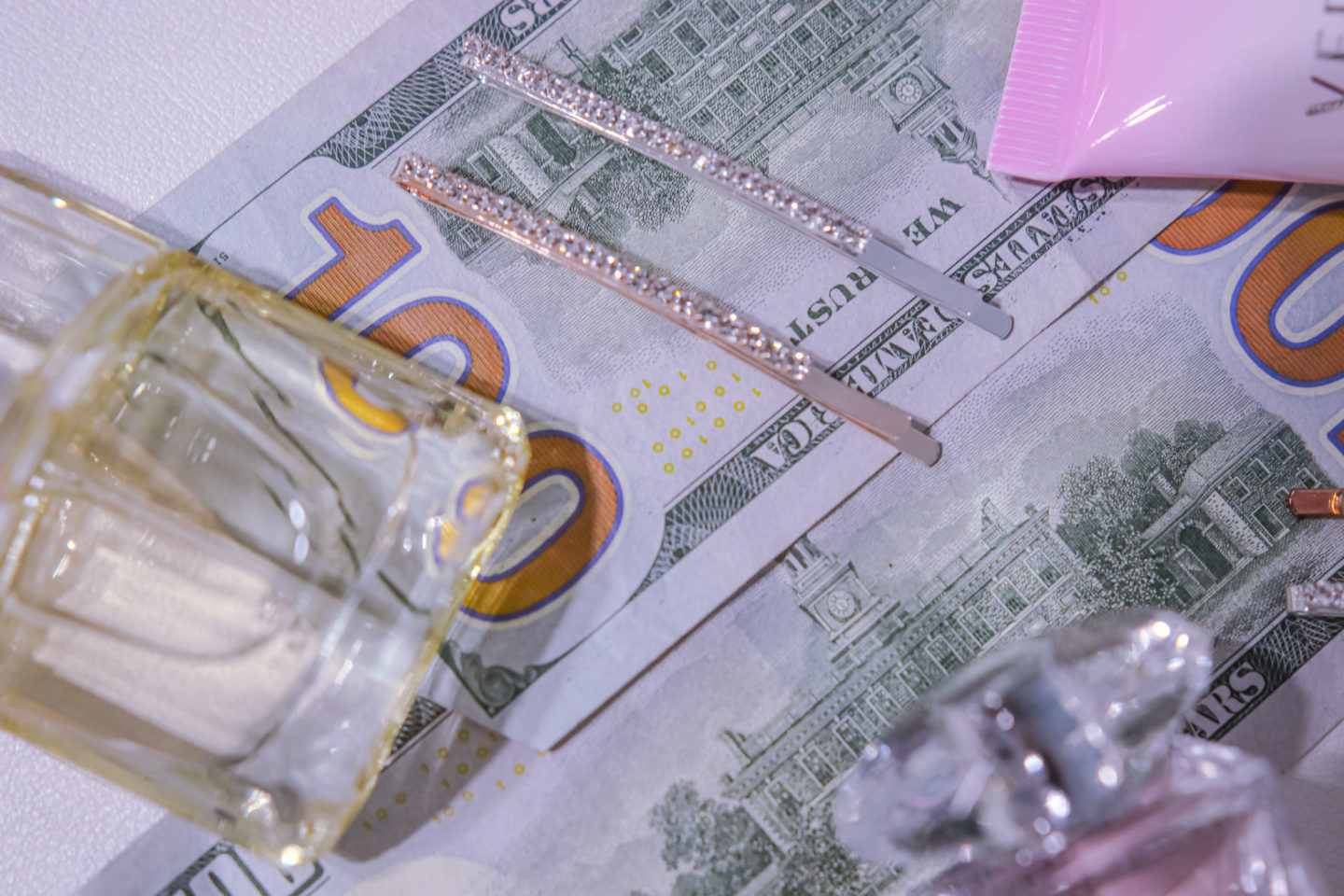
One thing I have always prided myself on is my budgeting skills. People ask me all the time how I save money or shop smartly, and I have to admit that, now, it’s simply become second nature to me. I don’t think about it, I just do it. However, I will say that stressing about finances and trying to restrict yourself on money crazily usually leads to doing just that.
There’s no magic trick or secret recipe to spending your money smartly—it’s a learned skill, one that comes when you budget without actually budgeting. You don’t have to restrict yourself completely if you’re trying to save money. Budgeting is kind of like an art form that can be learned and molded over time to fit your life and personal needs.
Below are the tips and tricks I’ve learned and implemented over the years, the ones that have helped me and the people around me tremendously. These are the basics, and everything you need to get started. This is how to budget without actually budgeting.

Skip small food + drinks
Coffee, quick and easy food, and buying lunch at work need to go if you’re trying to get smart about budgeting. Though the prices of these things may seem inconsequential at the time, they do add up verrrrrry quickly. You don’t need to get coffee or go out to lunch every day in order to survive, be smart and make both at home. If you spend $10.00 Monday-Friday over the course of one week on food and drink, you’re already down $50.00. Now, imagine doing that weekly for one month—you’re now in the hole $200.00. These things add up quickly, and if you don’t make any adjustments to even the smallest things, you can’t be surprised when you realize you still haven’t managed to save any extra money.
Instead, Opt for one big night out monthly
Random bar dates or quick, small dates at places like chain restaurants are simply a waste of money when you’re trying to get smart about saving. Newsflash: chain restaurants aren’t that much cheaper compared to nicer restaurants (trust me, I’ve checked and proven the people who disagreed wrong, many times), and their quality of food and portion size is poorer. Random bar dates are also unnecessary because you could get a bottle of wine for under $20.00 and have a drink in the comfort of your own home.
Instead, try having one big night out a month. This will not only save money from adding up, it’ll also make the night out that much more special and exciting. I’ll take better food, a nicer environment and ambiance, and getting dressed up once a month over a quick bar or dinner date any day. By doing this you’re not restricting yourself—you’re still allowing yourself to enjoy your life—you’re just being smarter about it. I guarantee you that if you take the money spent on drinks and quick food it’ll add up to the same if not more for one big night out. Stay in, and cherish the one big night out.
Buy the products you need when you need them—then look for sales
There are some things we can’t (and shouldn’t) get away with not buying—like soap, for example. We need soap to wash our hands and use in the shower, so we’d be out of our minds if we decided to stop buying soap because we wanted to save a little extra money. Dramatic and wild example, I know, but bear with me for a moment.
When it comes to skincare, I know that I can’t get away without buying it because it’s important. (I don’t want to look like I’m 90 years old at 30, lol.) So, when it comes time for me to buy more skincare products, I look for sales to see if I can make the purchase any better. If I know I’m going to continue using a product, and there’s some deal going on—say, buy two, get one free—then I’ll do just that. Why wouldn’t I spend more money in the moment and get the sale price instead of waiting for when I run out in the future because I don’t want to spend a lot of money at once? It’d make no sense!
Keep an eye out for sales when it comes to purchasing things you need. You can’t think short-term when it comes to spending, you have to think the opposite. Be smart about it and make a conscious decision whenever you buy anything.

Be smart when it comes to free shipping
I can’t tell you how many times I’ve talked to business owners who have said that their sales skyrocket whenever they run a free shipping on all orders sale. For some reason, people will go and buy more than they would’ve originally. They think they’re getting a better deal because they don’t have to pay for shipping—but they’re really not.
I’m a huge online shopper, almost all of my shopping is done online, and I’ve almost fallen into the gleaming promise of free shipping over a certain amount of dollars before, it happens to the best of us. When I find myself gunning for free shipping, I stop and go over every item in my cart to weed out what I absolutely do and do not need. For example, the other day I was online shopping and the website offered free shipping over $50.00, and I had a gift card for $30. I ended up adding more and more things into my cart until the total amount was close to $70.00, and then I realized that I would be spending way more money than I’d initially planned all because I wanted free shipping. When I added it up, I was still losing money. I unfortunately did have to pay for shipping after I revised my cart, but I paid a lot less than I would’ve had I stuck with my goal of getting free shipping.
When it comes to free shipping, look at the products in your cart and see how far away you are from receiving it. If you’re $5.00 away and have your eye on a product that costs, say, eight; well then it’s worth spending the extra $3.00 because you would’ve paid $5.00 in shipping anyway. If I can find a product that’ll put me at the free shipping mark but also keep me from not spending more than $5.00-$8.00, I’ll most definitely add another product into my cart. I stick to that specific range of money because of the fact that after shipping and taxes I’m usually adding that onto my original amount anyway.
Free shipping is great, but don’t be fooled by it.
Cheaper doesn’t always mean better
There are certain things in life you can’t skimp on—like razors (have you ever tried shaving with a cheap razor? The worst!), hair, or electronics—and others where going for the more affordable option is indeed smarter. However, there are some things to keep in mind when you’re comparing a pricier option with the more affordable one.
Sometimes something will be more affordable because it’s smaller. I like a lot of stuff from e.l.f Cosmetics—their prices are extremely affordable for the average consumer—but a lot of their products are a lot smaller than those from a middle-of-the-road priced company or a high-end one. Relying on the smaller, cheaper, option may be good for a short period of time, but chances are I’m going to run out of product faster and end up needing more sooner anyway; so did I actually save any money? Not really. Make sure you’re looking at every last detail when comparing options.
Also, sometimes things are cheaper because of the fact that their quality is poorer. In the past I’ve bought candles from Walmart and Yankee Candle—obviously the candles from Walmart were much more affordable—but when I used them they died down fast than any Yankee Candle ever would. Again, was it worth it? No, not really. I’d rather invest in something that’ll last me longer and serve its purpose for an extended amount of time (I’m talking months on end, everyone) than have to run back to the store every other week. Electronics are also the same when it comes to this. If you’re investing into an electronic device like a computer, laptop, TV, etc. it’s important that you take the time to research the best option that fits your needs. If you skimp and go for the cheaper option, you’re going to end up regretting. 1) it won’t last as long; 2) it’ll be less durable, you’re going to have to spend money on fixing or replacing it; and, 3) by the time you’re finished fixing and replacing it, the amount of money you’ve spent add up to more than the price of the more expensive item from the beginning.
Do your research on everything. Look at the size, ingredients, reviews—all of it. If possible and the purchase makes sense, opt for the store brand option.

Don’t stress, practice makes perfect
You’re not going to become a master budgeter overnight, it’s going to take time, some getting used to, and practice. Try implementing these practices into your daily life little by little. Try starting out with skipping the coffee and fast food for one week, then forfeit the random bar and dinner dates the following week, and so on and so forth. Eventually, once you’ve figured it all out, you’ll know when it’s worth it to splurge on yourself a little bit, and in turn, when you need to be smart and save your money.


